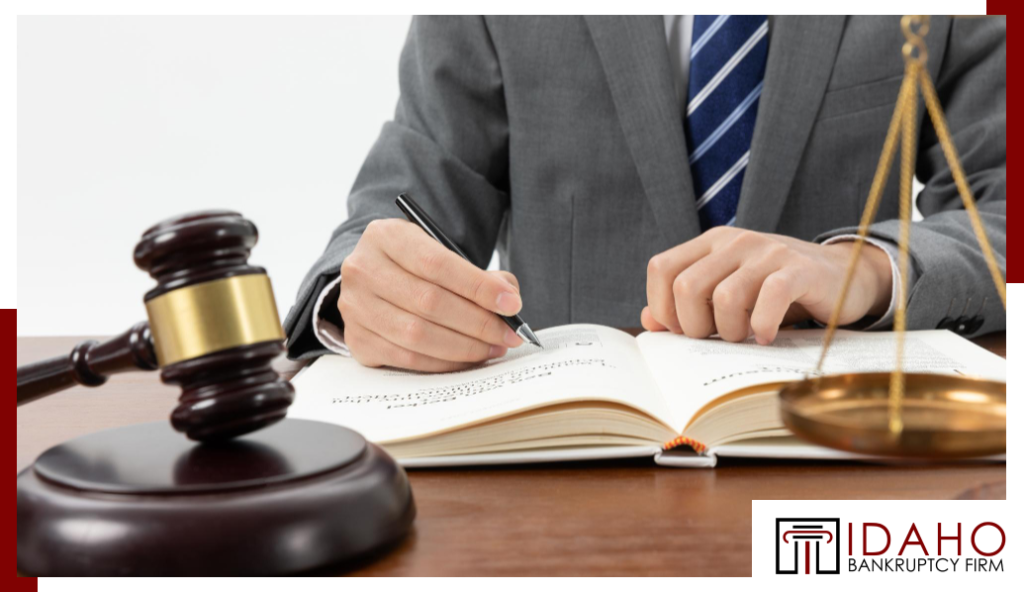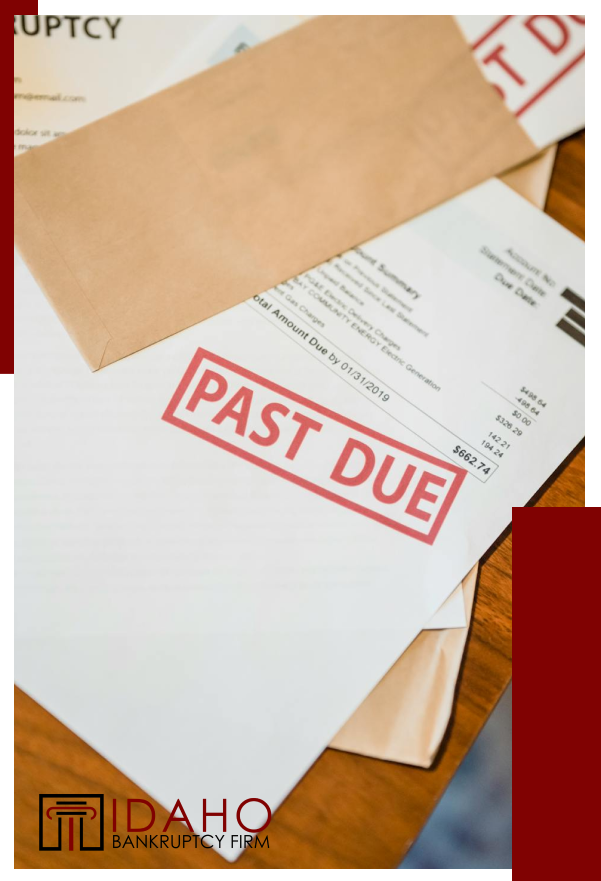Navigate Your Fresh Start: A Guide to Chapter 7 Bankruptcy Idaho
In Idaho and burdened with debt? Chapter 7 bankruptcy Idaho may offer a reset. Learn the essentials: how to file, costs involved, and Idaho-specific legal considerations. This direct guide simplifies the process, detailing the qualifying steps, navigating exemptions, and the aftermath of filing, putting you on a path to a debt-free start.
Key Takeaways
- Chapter 7 bankruptcy in Idaho provides a means for individuals to eliminate unsecured debts through the liquidation of non-exempt assets, overseen by a court-appointed trustee and guided by state law and bankruptcy code requirements.
- Eligibility for Chapter 7 bankruptcy in Idaho requires passing a means test, and the process includes mandatory credit counseling and debtor education courses to explore debt relief options and learn financial management for post-bankruptcy life.
- Filing for Chapter 7 bankruptcy incurs costs, including a filing fee and potential attorney fees, and involves exemptions that protect certain personal assets, such as home equity, vehicles, and retirement accounts, from liquidation.
Understanding Chapter 7 Bankruptcy in Idaho
Chapter 7 bankruptcy in Idaho is designed to help individuals with limited disposable income eliminate their unsecured debts and gain a fresh financial start. Unlike Chapter 13, which involves reorganizing and repaying debts over time, Chapter 7 focuses on liquidating non-exempt assets to pay off creditors. This process prioritizes secured creditors—those with a security interest in your property—over unsecured creditors, such as credit card companies and medical providers.
Filing for Chapter 7 bankruptcy involves several steps and requires a thorough understanding of the bankruptcy code and Idaho state law. The journey begins with the bankruptcy petition, a comprehensive document detailing your financial situation, followed by the appointment of a bankruptcy trustee who will oversee your case. Understanding these initial steps is crucial to navigating the bankruptcy process effectively.
The bankruptcy petition marks the start of your case, requiring detailed schedules of assets, liabilities, income, and expenditures. This document is submitted to the bankruptcy court and is pivotal in determining the course of your bankruptcy proceedings. Equally important is the role of the bankruptcy trustee, a court-appointed official who manages your non-exempt assets and ensures compliance with bankruptcy laws. Together, these components form the backbone of the Chapter 7 bankruptcy process in Idaho.
The Bankruptcy Petition
- Schedules outlining your assets, liabilities, income, expenditures, and creditor information
- A statement of compliance
- A certificate from a credit counseling provider, proving that you have completed the mandatory pre-filing credit counseling

It is essential to accurately complete these schedules as they form the basis of your bankruptcy case.
The bankruptcy petition serves as a formal request to the bankruptcy court to grant you relief from your debts. Upon bankruptcy filing, the court will review the petition and the accompanying documents to ensure all requirements are met. This includes verifying that you have completed credit counseling, which is a prerequisite for filing. The accuracy of the information provided in your petition is critical, as any discrepancies can lead to delays or even dismissal of your case.
Once the petition and other necessary documents are filed, the bankruptcy court takes over the proceedings. The court’s role involves overseeing the entire bankruptcy process, from the initial filing to the final discharge of debts. Understanding the importance of the bankruptcy petition and the role of the court can help you navigate this initial phase with confidence and clarity.

Role of the Bankruptcy Trustee
- Taking control of and managing your non-exempt assets
- Liquidating these assets and distributing the proceeds to your creditors
- Ensuring that the process adheres to the bankruptcy code and Idaho state law
The bankruptcy trustee’s duties extend beyond asset management. They also review and verify the accuracy of the bankruptcy forms you submit, ensuring all information is truthful and complete. This verification process is vital as it helps maintain the integrity of the bankruptcy system and protects the interests of both debtors and creditors. The trustee will also conduct the meeting of creditors, where they will ask you questions about your financial affairs under oath.
Understanding the trustee’s role can help you prepare for what to expect during your bankruptcy case. The trustee’s actions are guided by the goal of maximizing returns to creditors while ensuring you comply with all bankruptcy laws and regulations. Their involvement is integral to the successful resolution of your Chapter 7 bankruptcy, ultimately leading to the discharge of your debts.
Eligibility Requirements for Filing Chapter 7 in Idaho
To file for Chapter 7 bankruptcy in Idaho, you must first pass a means test. This test is designed to determine if your income is low enough to qualify for Chapter 7, or if you should consider Chapter 13 instead. The means test in Idaho compares your average monthly income to the median income for a similar household. This comparison helps determine eligibility for certain benefits or programs. If your income is below the median, you automatically qualify for Chapter 7.
The means test considers all sources of income, including:
- Business and rental income
- Pensions
- Unemployment compensation
- Any assistance received for household expenses
It’s a comprehensive analysis that ensures only those who genuinely cannot afford to repay their debts can file for Chapter 7. If your income exceeds the median, further calculations are made to determine if you still qualify based on your disposable income and monthly expenses.
Understanding the eligibility requirements is crucial for anyone considering Chapter 7 bankruptcy. The means test is a critical step in the bankruptcy process, and passing it ensures you can proceed with filing. If you don’t qualify, you may need to explore other options, such as Chapter 13 bankruptcy, which involves restructuring your debts and setting up a repayment plan.
Navigating Idaho Bankruptcy Exemptions
Idaho bankruptcy exemptions play a vital role in protecting your assets during the Chapter 7 bankruptcy process. These exemptions allow you to retain certain property, shielding it from liquidation to pay off creditors. Understanding and correctly applying these exemptions can significantly impact your financial recovery post-bankruptcy.
One of the most important exemptions in Idaho is the homestead exemption, which protects up to $175,000 in equity in your home, or $350,000 if you are married and own the home jointly. This exemption ensures that you do not lose your primary residence in the bankruptcy process. Additionally, Idaho allows exemptions for up to $10,000 in vehicle value, $10,000 in tools of the trade, and specific amounts for personal property items like jewelry and firearms.
Retirement accounts, including 401(k)s, 403(b)s, and IRAs, can also be exempted up to $1,512,350 per person in Idaho. These tax exempt retirement accounts exemptions are designed to protect your future financial security, allowing you to emerge from bankruptcy with essential assets intact. Navigating these exemptions effectively requires a good understanding of Idaho state law and the bankruptcy code.
The Credit Counseling Requirement
Before you can file for Chapter 7 bankruptcy in Idaho, you must complete a credit counseling course from an approved provider. This course, which must be completed within 180 days prior to filing, is designed to help you understand your financial situation and explore alternatives to bankruptcy. Upon completion, you will receive a certificate that must be submitted with your bankruptcy petition.
After filing your petition and attending the meeting of creditors, you are also required to complete a debtor education course. This course focuses on financial management and is essential for receiving a discharge of your debts. Failure to complete this course can result in the denial of your bankruptcy discharge, underscoring its importance.
Both the credit counseling and debtor education courses are mandatory under federal law and typically cost between $10 to $50 per course. These courses are designed to equip you with the knowledge and skills needed to manage your finances effectively post-bankruptcy, ensuring a more stable financial future.

Filing Your Bankruptcy Case at the Idaho Bankruptcy Court
The process of filing your bankruptcy case at the Idaho Bankruptcy Court involves several critical steps. First, you need to gather all your financial information, including bank statements, tax returns, pay stubs, and a comprehensive list of your assets and creditors. This information is essential for accurately completing the bankruptcy petition and other required forms.
Next, you will prepare your petition using the official federal bankruptcy forms available on the U.S. Courts website, as well as any local forms specific to Idaho. These forms must be filled out meticulously to avoid any errors that could delay your case. In Idaho, if you have any domestic support obligations, such as child support or alimony, you must include a Separate Statement of Domestic Support Obligation with your filing.
Once all forms and documents are prepared, you will file bankruptcy with the Idaho Bankruptcy Court. This step officially begins your bankruptcy case, and the court will then review your petition, appoint a trustee, and schedule the meeting of creditors. Being thorough and accurate in this phase is crucial to ensuring a smooth bankruptcy process.
What Happens After Filing for Chapter 7 Bankruptcy
Once you file for Chapter 7 bankruptcy in Idaho, an automatic stay goes into effect. This stay halts all collection activities by creditors, providing you with immediate relief from creditor harassment and collection efforts. Creditors are notified of your filing and must cease all collection activities unless they receive permission from the court.
After filing, you will attend a mandatory meeting of creditors, where your financial affairs will be examined. This meeting provides an opportunity for creditors to question you about your finances and the information provided in your bankruptcy petition. Typically, the entire process from filing to receiving a discharge takes about four months.
Receiving a discharge order from the court means that you are no longer personally liable for the discharged debts. This order prohibits creditors from making any further collection attempts or communications regarding the discharged debts. Understanding what happens after filing helps you prepare for the steps ahead and ensures you comply with all requirements.
Meeting of Creditors and Confirmation Hearing
The meeting of creditors, also known as the 341 meeting, is a mandatory part of the Chapter 7 bankruptcy process. During this meeting, you will be questioned under oath about your financial affairs by the bankruptcy trustee and any attending creditors. This meeting is crucial for affirming the accuracy of your bankruptcy petition.
Creditors have the opportunity to attend the 341 meeting and ask you questions about your financial situation and any concerns they may have. This transparency ensures that all parties involved have a clear understanding of your financial circumstances. Proper preparation and honesty during this meeting are essential to maintaining the integrity of your bankruptcy case.
Understanding what to expect during the 341 meeting can alleviate some of the anxiety associated with the bankruptcy process. It is an opportunity to clarify any issues and demonstrate your commitment to resolving your financial situation. Successfully navigating this meeting brings you one step closer to achieving a discharge of your debts.
Life After Bankruptcy Discharge

Life after bankruptcy discharge can be significantly more manageable as you are no longer overwhelmed by unmanageable debts. It is important to take this opportunity to rebuild your credit and financial stability. Engaging in sound financial practices and possibly seeking financial advice can help you make the most of your fresh start.
Understanding the implications of a bankruptcy discharge helps you prepare for life after bankruptcy. It can be a turning point, allowing you to focus on building a more secure financial future without the burden of past debts. With the right approach, you can leverage this fresh start to achieve lasting financial health.
Costs Associated with Filing Chapter 7 in Idaho
Filing for Chapter 7 bankruptcy in Idaho involves several costs that you need to consider. The primary expense is the filing fee, which totals $338. This fee includes a $245 filing fee, a $78 administrative fee, and a $15 trustee surcharge. If you cannot afford to pay the filing fee upfront, you may request to pay it in installments over 120 days with the court’s permission.
Attorney fees are another significant cost associated with filing for Chapter 7 bankruptcy. These fees typically range from $800 to $1,500, depending on the complexity of your case and the attorney’s experience. In major cities like Boise, the costs can be higher, ranging from $1,200 to $1,975, influenced by local competition and living expenses. It’s important to discuss fees upfront with your attorney to avoid any surprises.
Additionally, you may incur other out-of-pocket expenses, such as transportation to court hearings and fees for obtaining credit reports. Some individuals may qualify for a waiver of the filing fee if their income is less than 150% of the poverty line. Understanding these costs helps you plan financially for the bankruptcy process and ensures you are prepared for all associated expenses.
Seeking Professional Help: When to Contact a Bankruptcy Attorney
Navigating the complexities of Chapter 7 bankruptcy can be challenging, making it advisable to seek professional help from a bankruptcy attorney. An experienced attorney can guide you through the intricate details of the bankruptcy process, from filing the petition to understanding which Idaho exemptions apply to your case. They can also help you determine whether Chapter 7 or Chapter 13 bankruptcy is the better option for your situation.
A bankruptcy attorney can assist with:
- Preparing and filing the necessary forms
- Ensuring all documents are accurate and submitted on time
- Reducing the risk of errors that could delay your case or result in dismissal
- Providing valuable advice on dealing with wage garnishment, foreclosure issues, and unfriendly creditors
- Helping to protect your assets and interests throughout the process.
Summary
Understanding Chapter 7 bankruptcy in Idaho is essential for anyone considering this path to resolve their financial challenges. From the initial filing of the bankruptcy petition to the role of the bankruptcy trustee, and navigating Idaho’s specific exemptions, each step requires careful consideration and compliance with the bankruptcy code. The means test determines eligibility, while mandatory credit counseling and debtor education courses ensure you are prepared for life after bankruptcy.
The costs associated with filing, including court fees and attorney fees, are important to plan for, and seeking professional help can make a significant difference in the outcome of your case. An experienced bankruptcy attorney can guide you through the complexities, helping you avoid common pitfalls and protect your assets.
As you consider Chapter 7 bankruptcy, remember that it offers a pathway to a fresh start, free from overwhelming debt. By understanding the process and seeking the right help, you can navigate this journey with confidence and move towards a more stable financial future.
